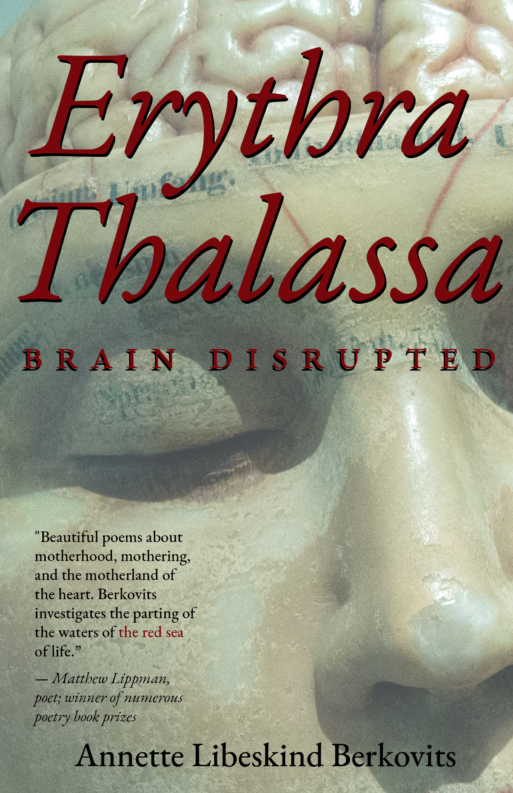
Credit: Books Forward
“Erythra Thalassa” is the title poem from Annette Libeskind Berkovits‘ recent book, which chronicles her adult son’s debilitating stroke through poetry. Berkovits, who spent three decades working for the Wildlife Conservation Society in New York as senior vice president, has published a wide array of literary work, including two memoirs, a historical novel, and numerous short stories.
After Berkovits’ son Jeremy suffered a hemorrhagic stroke at the age of 46, she entered a stark new reality in which Jeremy might never fully return to his old self. In “Erythra Thalassa,” she likens the hemorrhage to a flood, transforming the landscape of her son’s brain in an instant.
In the myriad gray folds
no neuron, no synapse,
no astrocyte,
no oligodendrocyte,
no microglia left dry.
Epic flood.
The intensity and desolation of this passage contrasts with its technical terminology. Science, like poetry itself, can be a means of both understanding and abstracting painful experiences. Berkovits, a scientist by profession, seems to wield these sterile terms as a way of mapping out the incalculable reality that confronts her.
There is a particular brutality to the sudden and random nature of a stroke, especially among people who are young and otherwise healthy. The ripples of this shock can be felt in Berkovits’ poems. At times, her work emanates the sort of quiet hysteria that comes with waiting out a loved one’s fate. The last few lines of “Erythra Thalassa” are a series of urgent questions, evoking the powerlessness Berkovits feels as she tries to discern her son’s future.
How long the deafening
stillness? How long the ears
shuttered closed?
How long will eyelids
veil his light?
After several surgeries, Berkovits’ son eventually recovered his full cognitive abilities, but his body remained completely paralyzed. As Berkovits shared in an interview with Cheryl Jones, this outcome was the reverse of doctors’ predictions — proving that even medical experts are still baffled by the workings of the brain. “In many ways, I think the brain is like a planet that’s yet to be explored. We see only maybe the outer rings of it,” she told Jones.

Credit: Books Forward
Berkovits navigates that mysterious planet with grace, affection, and honesty. Her work encapsulates the razor-sharp vulnerability of sudden trauma and its aftermath. Blending science and plainspoken narrative with emotional and evocative descriptions, Berkovits’ poems guide the reader through a wrenching yet beautiful journey.

 “Erythra Thalassa” by Annette Libeskind Berkovits
“Erythra Thalassa” by Annette Libeskind Berkovits


 How Dare You Die Now!
How Dare You Die Now!
 Debating Medical Aid in Dying
Debating Medical Aid in Dying
 “Help Me, Helen”
“Help Me, Helen”














